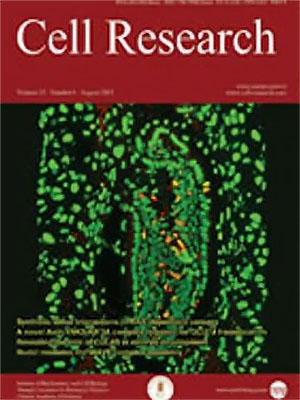
Volume 13, No 1, Feb 2003
ISSN: 1001-0602
EISSN: 1748-7838 2018
impact factor 17.848*
(Clarivate Analytics, 2019)
Volume 13 Issue 1, February 2003: 49-58
ORIGINAL ARTICLES
Clusterin mRNA expression in apoptotic and activated rat thymocytes
Jung-Hyun PARK1, Jee-Sun PARK2, Sung-Kyu JU2, Kwan-Bok LEE2, Yoo-Kyoung PARK3, Myung-Hee KANG3, Shin-Young NA4, Kwan-Hee YOU2, *
1Experimental Immunology Branch, National Cancer Institute, NIH, Bethesda, MD 20892, USA
2Department of Biology, College of Natural Science, Chungnam National University, 220 Gung-dong, Yuseong-gu, Daejeon 305-764, Korea
3Department of Food and Nutrition, Hannam University, Daejeon 306-791, Korea
4Institute for Virology and Immunobiology, University of Wuerzburg, Versbacher Str. 7, 97078 Wuerzburg, Germany
Correspondence: Kwan-Hee YOU(khyou@cnu.ac.kr)
Clusterin is a 75-80 kDa heterodimeric glycoprotein, that is produced in most tissues but which exact biological role is still not clear. Particularly, its role in protection or promotion of apoptosis is heavily disputed, since data supporting both views have been reported in several independent studies. To clarify this issue, and also to determine whether clusterin expression itself might be affected by apoptosis, in the present study, rat thymocytes were treated with dexamethasone, -a synthetic glucocorticoid that elicits apoptosis in thymocytes-, and clusterin mRNA expression was analyzed by semi-quantitative RT-PCR before and after induction of apoptosis. Interestingly, neither the treatment with dexamethasone in vitro nor triggering of apoptosis in vivo up- regulated clusterin expression, opposing the view that clusterin is involved in apoptotic processes. On the other hand, a new clusterin mRNA isoform was detected and isolated, whose expression was restricted to freshly isolated thymocytes. This novel isoform lacks the post-translational proteolytic cleavage site and is therefore predicted to encode a monomeric protein. The biological function under normal circumstances, however, will need further investigations for clarification. While apoptosis could not modulate clusterin expression, activation of thymocytes with concanavalin A and interleukin-2 resulted in up-regulation of clusterin mRNA level, indicating that clusterin expression is rather under the control of cell activation-mediated rather than apoptosis- induced signals.
FULL TEXT | PDF
Browse 2166


